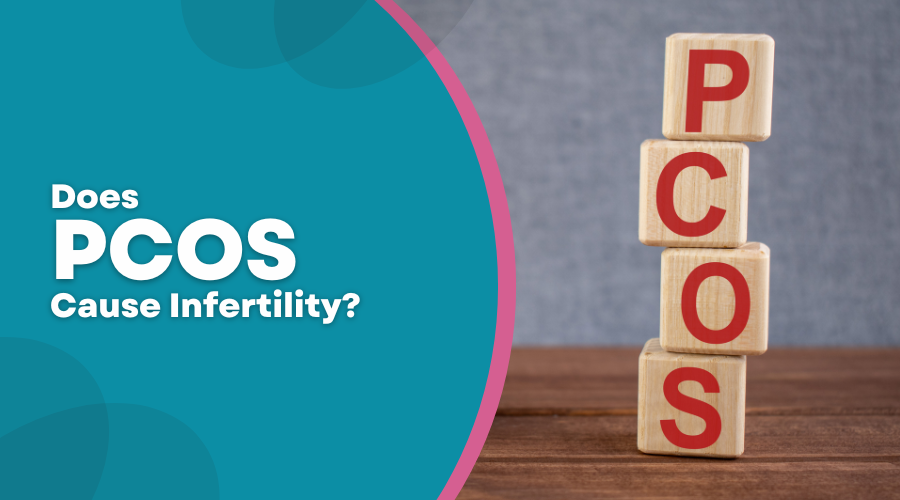Let’s get this out of the way: if you’ve just been diagnosed with PCOS and your mind jumps straight to “Will I ever be able to get pregnant?” You’re not overthinking. It’s a valid worry. And you’re definitely not alone.
But here’s the good news. PCOS (Polycystic Ovary Syndrome) doesn’t automatically shut the door on fertility. Sure, it complicates things. But infertility isn’t a guaranteed outcome. Not even close.
At Nisha IVF Centre in Ahmedabad, we meet women every day who are navigating this very concern. Some are just starting their journey, others have tried for years. Many of them now hold babies they once feared they’d never have.
So, does PCOS cause infertility? Let’s take a closer, more compassionate look.
What Is PCOS and How Is It Linked to Fertility?
Think of PCOS like a tangled web of hormones that throws your reproductive system off track. It’s not just about “cysts” on the ovaries despite the name.
At its core, PCOS messes with hormone balance. Too much insulin. Too many androgens (male hormones). And disrupted signals to the ovaries. The result? Irregular cycles, missed ovulation, or ovulation that’s so unpredictable it’s hard to time anything.

And if there’s no ovulation, there’s no egg to fertilize. That’s why PCOS ranks high on the list of common causes of infertility.
But here’s what’s equally important: PCOS is also one of the most manageable conditions when it comes to fertility.
How PCOS Impacts Ovulation and Egg Quality
Let’s talk about ovulation, the star of the show when it comes to getting pregnant.
In a typical cycle, the ovaries grow a follicle, release a mature egg, and give it a shot at meeting sperm. With PCOS, that process can stall. Eggs might not mature. Or they do, but ovulation never happens. You’re left with long gaps between periods or no periods at all.

And even when ovulation does happen, hormonal imbalance can mess with egg quality. Now, this doesn’t mean every woman with PCOS has poor-quality eggs but it’s something your doctor will keep an eye on.
At Nisha IVF Centre in Ahmedabad, we monitor ovulation patterns closely and use targeted treatments to help get the cycle back on track. Because the key to tackling infertility with PCOS? Understanding exactly how your body responds.
Is Infertility Inevitable with PCOS? Let’s Break the Myth
Short answer no. Long answer: Absolutely not.
We’ve worked with women who’ve conceived on their first medicated cycle, and others who needed a bit more support. But infertility with PCOS isn’t a guarantee. It’s more like a roadblock you can navigate with the right tools.
PCOS often delays the process, sure. But it rarely ends altogether.
You may need to take the scenic route instead of the express lane but there is a route.
Not sure what your next step should be?
Get a personalized fertility roadmap designed just for you.
Talk to a PCOS Fertility Expert at Nisha IVF
Treatments That Help Women with PCOS Conceive
Here’s what a lot of women don’t hear enough: You have options. And they’re not all invasive or expensive.
Some start with lifestyle changes, losing even a small amount of weight (we’re talking 5–10%) can restart ovulation naturally. Others may need medications like Letrozole or Clomiphene to help the ovaries release an egg.
Still others benefit from Metformin, which helps with insulin resistance (a common issue in PCOS).

And if those don’t do the trick, there’s always IUI or IVF, both of which can work extremely well for PCOS patients, especially with careful monitoring.
At our IVF Centre in Ahmedabad, we often combine approaches medication, nutrition support, cycle tracking because no two PCOS journeys are identical.
Realistic Expectations: How Long Does It Take to Get Pregnant with PCOS?
If you’re hoping for a number, we hear you.
Some women conceive within three to six months of starting treatment. Others take a year or longer. Factors like age, weight, egg quality, and whether there are other causes of infertility in play all matter.
The key is patience and persistence.
One of our patients with PCOS had irregular cycles and hadn’t ovulated in months. After three cycles of medication and dietary support, she ovulated and conceived.
So yes, the timeline varies. But progress happens with the right plan.
Trying everything and still no luck?
Let’s build a custom treatment strategy that works with your PCOS—not against it.
Book Your Strategy Session Today
FAQs: Common Questions About PCOS and Infertility
Does PCOS cause infertility in everyone who has it?
Nope. While it makes pregnancy trickier for some, many women with PCOS conceive naturally or with minimal help.
What are the most common symptoms of PCOS?
Irregular periods, acne, weight gain, excessive hair growth, and sometimes—no symptoms at all.
What are the causes of PCOS?
We don’t fully know. But genetics, insulin resistance, and inflammation seem to play big roles.
Do I need IVF if I have PCOS?
Not necessarily. Many women succeed with simpler options like ovulation medications or IUI.
Can I treat PCOS infertility naturally?
Sometimes yes, especially if weight and lifestyle changes help restore ovulation. But many women need medical support, and that’s okay too.
Final Thoughts: PCOS and Fertility – It’s Not a Dead End
If PCOS has made you feel like your fertility journey is over before it began—don’t buy into that fear. This isn’t the end. It’s just a different path.
Does PCOS cause infertility? It can. But with the right support, guidance, and persistence, it doesn’t have to define your future.
At Nisha IVF, we’re here to help you navigate the twists and turns—whether you’re just exploring options or gearing up for IVF. Your journey is yours, and we’ll walk it with you.
References
- Centers for Disease Control and Prevention (CDC)– PCOS and Infertility
https://www.cdc.gov/diabetes/basics/pcos.html - American College of Obstetricians and Gynecologists (ACOG) – Polycystic Ovary Syndrome FAQs
https://www.acog.org/womens-health/faqs/polycystic-ovary-syndrome


